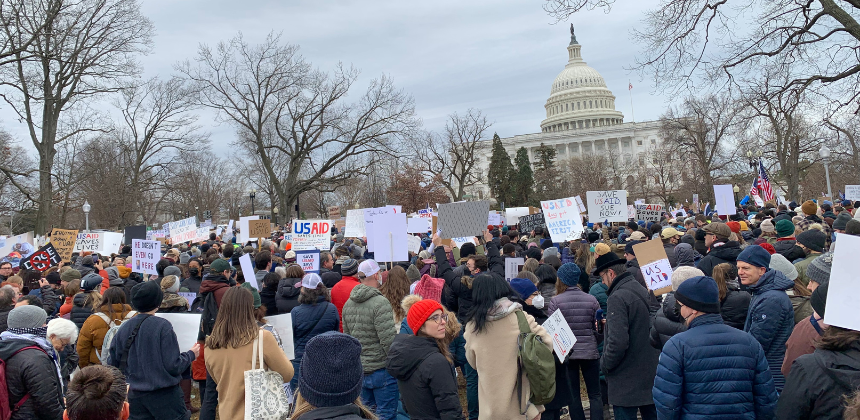
In just weeks, millions of vulnerable women and girls—in the US and around the world—have been plunged into a new reality. The new administration’s immediate freeze on billions of dollars of humanitarian assistance endangers countless lives and is destabilizing vulnerable communities globally.
With no time to put in place safety nets or mitigation plans, within hours refugees in Syria were left stranded in camps, without food, water, or security services and pregnant women in places like Haiti and Gaza lost access to already-scant maternal healthcare services. In Sudan, 434 out of 634 soup kitchens have been forced to shut down in Khartoum alone, meaning thousands of people have lost access to their only daily meal. Food—already paid for by US taxpayers—now sits rotting in warehouses, instead of reaching communities at risk of famine. Medications that could stop pregnant women dying from hemorrhage cannot be transported to clinics, as truck drivers were paid by USAID.
US foreign humanitarian assistance counts for less than 1 percent of the federal budget (proportionally less than many other wealthy nations); USAID is less than 0.5 percent. Yet these slivers of the US federal budget account for 40 percent of aid globally, and fund programs reaching 122 million people in need. Until earlier this year, the US was the largest donor to the World Health Organization, the UN Refugee Agency (UNHCR), and the UN Population Fund (UNFPA), and to crises such as Sudan and Ukraine, providing food, clean water, healthcare, and shelter to millions displaced by conflict and crisis. Without US funding, systems that protect life during conflict, disasters, and displacement—such as the Famine Early Warning Systems Network, which went offline last week—have already started to collapse.
The damage that will be done in 90 days will have life-long consequences. A 90-day freeze on US-funded family planning assistance alone could lead to 4.2 million unintended pregnancies, and over 8,000 women and girls dying from complications during pregnancy and childbirth. The abrupt end of programs that tackled infectious disease means that, in the next 90 days, millions of people will be at increased risk of contracting preventable but fatal diseases such as malaria and tuberculosis. An estimated 136,000 babies could acquire HIV during the 90-day freeze. Women and girls will be at greater risk of violence, trafficking and exploitation; displaced and conflict-affected pregnant women will face higher risks of complications, premature labor, and maternal deaths; and where food, water, and sanitation become scarce, women and girls will suffer. Women, girls, and marginalized groups will experience traumas in the next 90 days that will destabilize their lives, their families, and their communities for generations.
The efforts this week to fully dismantle USAID, including placing tens of thousands of staff members and local partner staff around the world on leave underscores the painful truth of this new reality: the new administration is walking away from years of US investment in global health, security, and stability, leaving a dangerous void. The damage has been compounded by other Executive Orders that restrict foreign assistance beyond the 90-day review period. The reinstatement of the global gag rule, ending support for diversity, inclusion, and gender equality, and withdrawing US funding for the World Health Organization, the UN Human Rights Council, and the UN Relief and Works Agency for Palestinian Refugees in the Near East (UNRWA) mean that millions of vulnerable people will continue to be denied the lifesaving assistance and human rights protections they need. Six million Palestinians risk losing access to education, healthcare, and livelihoods; millions of women and girls living in conflict and crisis will lose access to lifesaving reproductive healthcare; efforts to address gender-based violence, including protection for women, girls, men, and boys from sexual violence, will be hampered.
The funding freeze must end, and funds released so that essential humanitarian assistance programs can continue. Congress must intervene. The new administration does not have the authority to dismantle USAID without Congressional approval or withhold funds that Congress appropriated for the purpose of foreign assistance.
If the administration continues on this path, decades of progress on fighting poverty, strengthening global health, and advancing gender equality will be reversed. WRC will not stop working to mitigate harms, improve services, protect rights, and support displaced women and girls throughout their journeys as they seek safety and rebuild their lives.

